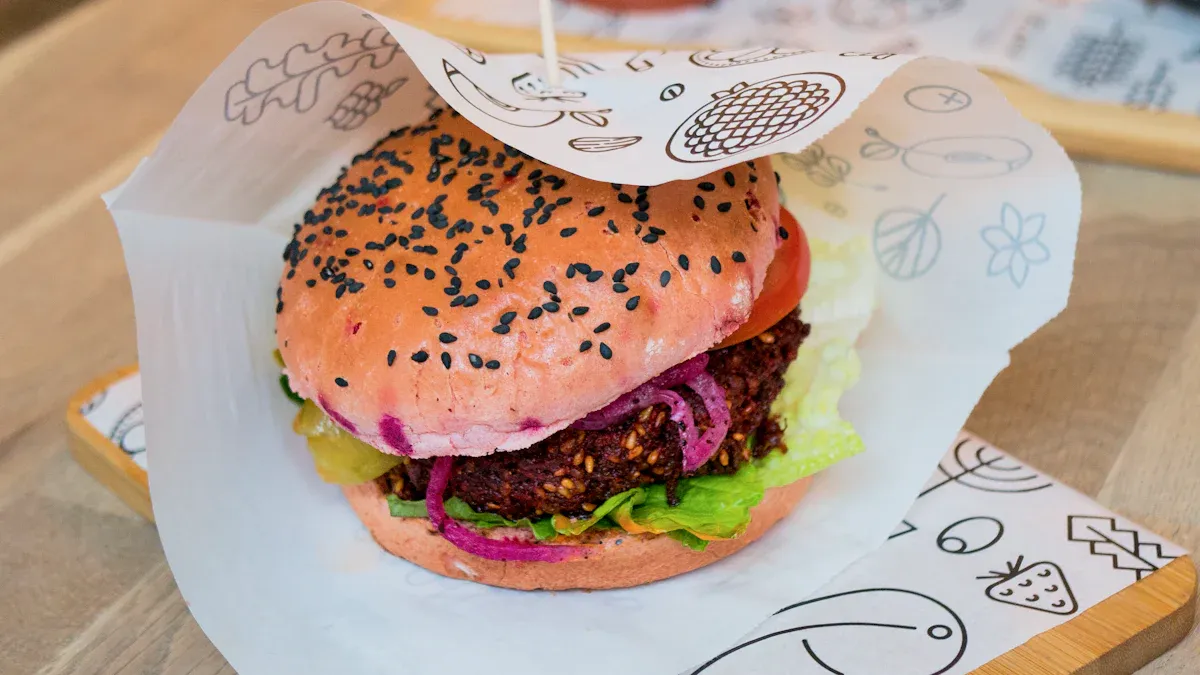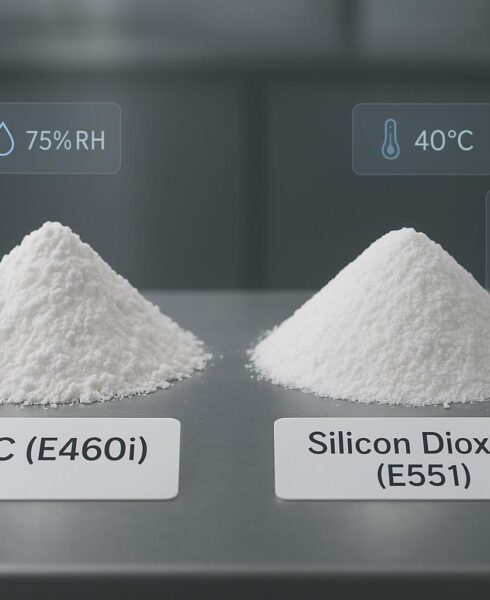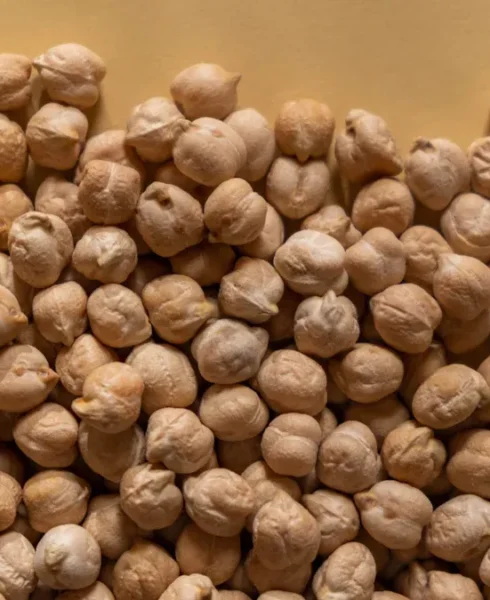Imagine you want food that tastes good and helps your health. Soy protein isolate plant-based meat lets you make that choice. Many people now choose these foods. They have fewer calories, less saturated fat, and no cholesterol. This is different from regular meat.
Nutrient Aspect | Plant-Based Meat | Traditional Meat |
|---|---|---|
Calories | Lower | Higher |
Saturated Fat | Lower | Higher |
Cholesterol | None | Present |
You help make meals healthier and easier to get. This happens as more people want plant-based foods around the world.
Key Takeaways
Soy protein isolate plant-based meat is better for your health than regular meat. It has fewer calories. It has less saturated fat. It does not have any cholesterol.
This plant-based choice gives you all the important amino acids. It is a good protein source for strong muscles and good health.
Soy protein isolate makes plant-based meats taste and feel better. It makes them chewy and tasty, like real meat.
Picking soy protein isolate helps the planet. It uses less land and makes fewer greenhouse gases than animal meat.
Plant-based foods are getting cheaper and easier to find. You can try more yummy meals and help your health at the same time.
What Is Soy Protein Isolate?
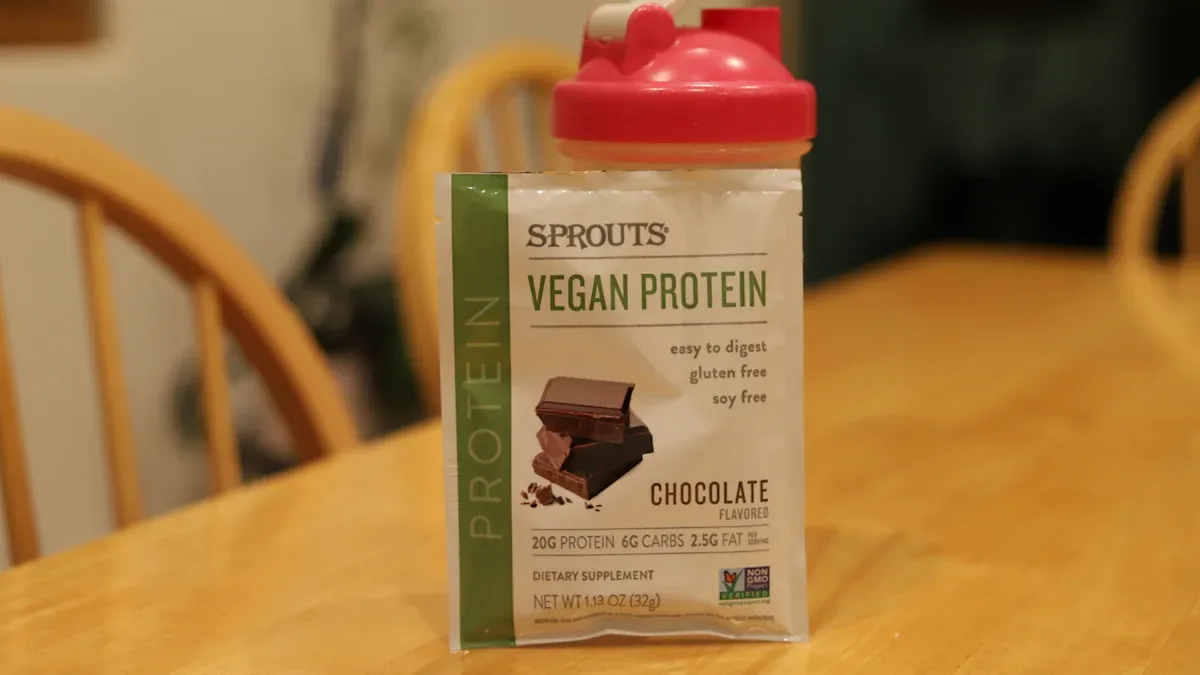
Definition
You might wonder how soy protein isolate is not like other soy products. Soy protein isolate is a very pure kind of soy protein. People make it by taking out most of the fat and carbs from soybeans. This leaves a product that is almost all protein. You can find soy protein isolate in many foods. These include soy protein isolate plant-based meat, protein shakes, and dairy alternatives. Many athletes and active people pick it. Your body can use it easily and it has a high biological value.
Here’s a simple comparison to help you see the difference:
Aspect | Soy Protein Isolate | Other Soy Products |
|---|---|---|
Definition | A highly purified form of soy protein obtained from defatted soy meal. | Includes soy flour, soy protein concentrate, etc. |
Composition | Primarily composed of proteins with minimal flavor and some soluble carbohydrates removed. | Varies, often contains more carbohydrates and fats. |
Processing Methods | Obtained through aqueous or mild alkali extraction, followed by precipitation and drying. | Less refined, may involve different extraction methods. |
You can see that soy protein isolate is cleaner and has more protein than other soy products.
Tip: If you want more protein but not extra fat or carbs, soy protein isolate is a good pick.
How It’s Made
You may want to know how soy protein isolate goes from a soybean to your food. The process has many steps to make sure it is pure and safe. Here are the main steps in a simple way:
Workers clean the soybeans.
They check and clean them again.
The beans are dried.
Machines take out stones by weight.
Iron is removed.
Ash is taken out.
The beans are crushed.
The crushed beans go through a screen that shakes.
Wind sorting separates the parts.
The beans are softened.
They are rolled into thin pieces.
Oil and solvent pull out things not needed.
The meal is desolventized.
A spinning machine takes out things that do not dissolve.
Acid helps the protein settle.
The protein is washed and made neutral.
The last product is dried.
Each step helps make soy protein isolate safe and high in quality. You get the benefits of this careful process when you eat foods like soy protein isolate plant-based meat.
Why It Matters
Texture
Texture is very important when you eat food. You want your food to feel good in your mouth. Soy protein isolate helps plant-based meat feel like real meat. When you bite a burger or sausage made with it, it feels chewy like animal meat. This happens because soy protein isolate holds water and oil well. It also has lots of protein and little fat. That makes it great for plant-based meat.
Soy proteins help plant-based meat feel chewy and nice.
Making soy proteins firm helps the food feel more like meat.
New machines, like high-moisture extrusion, turn soy protein isolate into stringy pieces. This makes the food pull apart and chew like real meat. Some companies use 3D printing to build plant-based meat in layers. This makes the texture even better.
When you eat soy protein isolate plant-based meat, you get a bite that feels close to real meat.
Flavor
Flavor is also very important when you eat. Soy protein isolate has a mild taste. It also takes on flavors added when you cook it. Scientists found that soy protein isolate has special flavor compounds. These can taste like grains, tofu, or soy milk. Here is a table that shows some of these flavors and what they taste like:
Flavor Compound | Associated Sensory Attribute |
|---|---|
hexanal | grain husk, oil oxidation |
heptanal | grain husk |
octanal | tofu |
nonanal | tofu, soy milk |
(E)-2-nonenal | soy milk |
(E,Z)-2,6-nonadienal | soy milk |
(E,E)-2,4-nonadienal | tofu, oil oxidation |
(E,E)-2,4-decadienal | grain husk, tofu, oil oxidation |
Soy protein isolate plant-based meat can taste mild or a little nutty. Chefs and food makers add spices and flavors to make it taste better. This helps you enjoy plant-based meals that taste good and feel familiar.
Protein Content
Protein helps your muscles and keeps you healthy. Soy protein isolate gives you lots of protein in each bite. It has all the amino acids your body needs. Your body can use this protein easily. More than 90% of it gets used by your body. This is better than many other plant proteins.
Soy protein isolate has all the amino acids, like whey protein.
It has 4.6% lysine, which is more than many other plant proteins.
It has less methionine, but you can eat other foods to get more.
Soy protein isolate plant-based meat gives you lots of protein and not much fat. This makes it a good choice if you want to eat healthy and get enough protein.
Soy Protein Isolate Plant-Based Meat Benefits
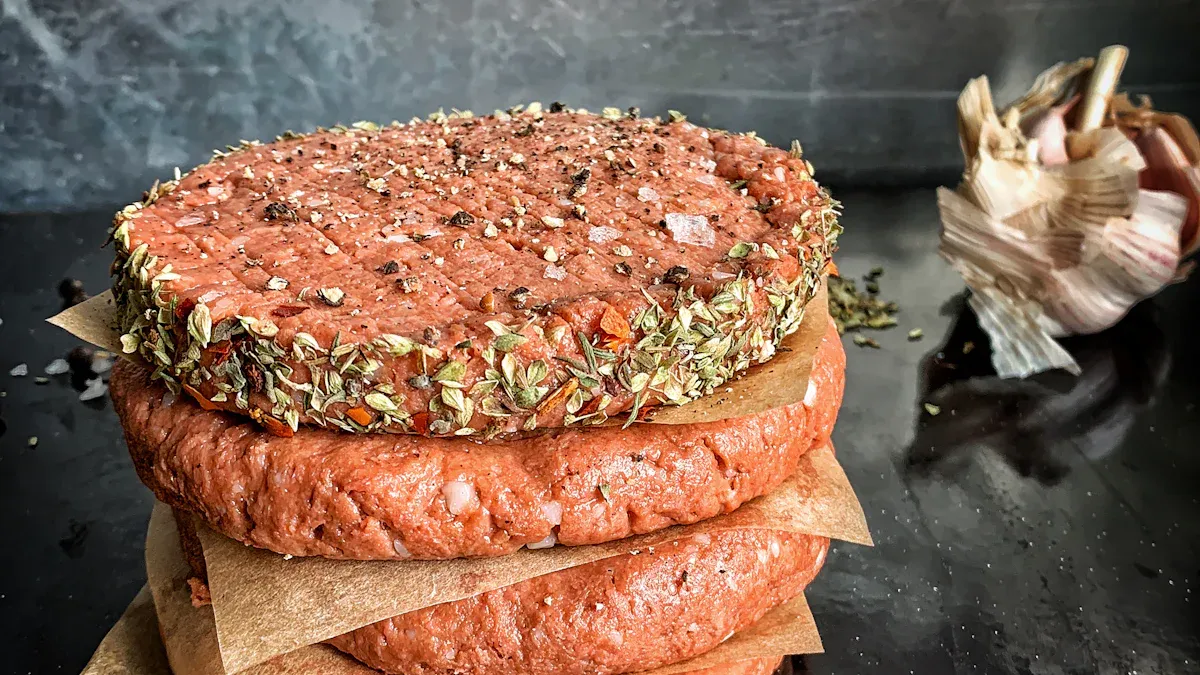
Nutrition
Soy protein isolate plant-based meat is good for your health. It gives your body all the protein it needs, just like animal meat. You also get important vitamins and small nutrients. For example, soy protein isolate has Vitamin C. Animal meat does not have Vitamin C. Soy protein also has fiber. Fiber helps your stomach work well and keeps you full. Animal meat does not have fiber.
Here are some key nutrition facts:
You get more vitamins and nutrients, like Vitamin C.
You eat more fiber, which helps your stomach and keeps you full.
You do not eat cholesterol, which can be bad for your health.
You get all the protein your body needs.
You may lower your cholesterol and get healthy plant nutrients.
Many studies show soy protein is good for your heart. People who eat more tofu and soy foods have a lower chance of heart disease. Soy protein helps you keep muscle when you lose weight. Some research says soy protein can help lower belly fat, especially for women after menopause. Eating soy protein may help stop some long-term diseases. These include heart disease, weak bones, and some cancers. You also help the planet when you pick plant protein instead of animal protein.
Tip: If you want to be healthy and help the earth, soy protein isolate plant-based meat is a smart pick.
Processing Advantages
Soy protein isolate is easy to use in making food. It helps plant-based meat keep its shape and cook well. Food makers like soy protein isolate because it works with many machines. You can mix it with other things, like sodium alginate and gelatin. This makes the meat firm and chewy. Some companies use 3D printing to make new shapes and textures. Adding xanthan gum and salt helps make the food easier to print and shape.
Here are some main processing benefits:
Soy protein isolate helps food feel like real meat.
You can mix it with other things for better chewiness.
It works with 3D printing and new ways to make food.
You get more choices for making different foods.
Soy protein isolate helps make more food from each batch. It holds water and forms gels, so the food is firmer. Mixing soy protein with wheat gluten makes the food even better. Some foods use special gels made from soy protein and polysaccharides. These gels act like fat in meat and make the food taste better. Adding polysaccharides helps the food hold water and feel like pork belly. Soy protein isolate makes the food firmer and lowers the fat.
You get more food because soy protein isolate helps make bigger batches.
You eat less fat because soy protein isolate can replace animal fat.
Your food is firmer and feels more like real meat.
Versatility
You can use soy protein isolate in many plant-based meats. It works well in burgers, sausages, and ground meat. It mixes well, forms gels, and holds oil and water. Food makers use soy protein isolate to make many foods with the right taste and feel.
Here is a table that shows how soy protein isolate is used in meat analogues:
Protein Ingredient | Composition (%w/w) | Functionality | Application in Meat Analogues |
|---|---|---|---|
Soy isolate | ~90 % protein | Good solubility, gelling, emulsification | Burger patties, minced meat, sausages |
You can try many meals with soy protein isolate plant-based meat. You can eat burgers, sausages, and other foods that taste like animal meat. This makes it easy to try new recipes and enjoy plant-based meals every day.
Note: Soy protein isolate lets you eat many plant-based foods without losing taste or texture.
Impact on Meals
Accessibility
You can find plant-based meat in more stores and restaurants than ever before. Many companies work to make these foods easier for you to buy. The cost of plant-based meat, including soy protein isolate plant-based meat, is getting closer to regular meat prices. Experts say prices may match by 2023. Right now, plant-based meat costs more than beef, pork, or chicken. When prices drop, you will see more people choosing these products. Price parity helps more families try plant-based meals. You also get more choices when you shop, making healthy eating easier.
Tip: Watch for new plant-based options in your local grocery store as prices become more affordable.
Meal Variety
You have many new meal choices because of plant-based meat. Soy protein isolate lets food makers create burgers, sausages, and other dishes that taste and feel like animal meat. You can enjoy different flavors and textures at home or when you eat out. Studies show that 61% of people ages 16-49 in the U.S. now eat more plant-based foods than before. Many people mix animal and plant proteins in their diets. This flexitarian trend gives you more ways to enjoy meals. Meat analogues are popular because people see them as healthier and better for the planet. The use of soy protein and other plant proteins helps make these foods taste good and look appealing.
More people eat plant-based foods each year.
Organic soy products grow over 10% every year since 2018.
You can try new recipes with burgers, sausages, and more.
Broader Appeal
You see more people from different backgrounds choosing plant-based meat. Young people, like millennials and Generation Z, lead the way. They care about health and the environment. Many want high protein and balanced nutrition, so they pick foods with soy protein isolate. People who care about the planet choose sustainable meat alternatives. This shift shows that values are changing. Some barriers remain, such as taste and texture. Heavy meat eaters may not switch easily. Some worry about additives and processed ingredients. Still, as plant-based meat improves, you will see more people trying it.
Note: You help shape the future of food when you choose plant-based meals for health, taste, and sustainability.
Common Concerns
Allergens
You might ask if soy protein isolate is safe for everyone. Soy is an allergen for some people. Some people react to soy protein in plant-based meat. Here are some facts you should know:
Soy protein is found in over one-third of popular supermarket brands in the UK.
Soy lecithin, made from soy, is in about two-thirds of grocery items. The FDA says it is an allergen, but some people with soy allergies can eat it.
Different soy proteins can cause different allergic reactions. Some people can eat cooked soy without problems. Others can have strong reactions, like anaphylaxis.
Symptoms of soy allergy are not the same for everyone. Some people must avoid all soy products.
If you have a soy allergy, always read food labels and talk to your doctor before eating new foods.
Processing
Some people say soy protein isolate plant-based meat is “highly processed.” Processing makes food safe, tasty, and easy to use. Food makers use different ways to improve texture and lower allergens. Here is a table that shows some common processing methods and what they do:
Processing Method | Advantages | Potential Issues |
|---|---|---|
Extrusion Processing | Lowers allergens, makes texture better | Needs high heat, may change taste |
Enzymatic Hydrolysis | Makes protein easier to digest | Can change flavor, sometimes adds bitterness |
Thermal Treatment | Lowers allergens | May change nutrients and taste at high heat |
Fermentation | Makes taste better and lowers some allergens | May not remove all allergens |
Non-Thermal Processing | Keeps more nutrients and food quality | May not lower allergens as much as heat |
You get food that is safe and tastes good, but processing can change taste or texture. Groups like the FDA and EFSA check for safety and allergens before these foods are sold.
Sustainability
You may care about how your food choices affect the planet. Soy protein isolate plant-based meat usually has less impact on the environment than animal meat. Here are some important points:
Soy protein isolate uses less land than beef and makes fewer greenhouse gases.
Plant-based proteins, like soy, make much less CO2 than animal proteins.
Changing from animal meat to plant-based proteins could lower land use by about 24%.
Many companies now use soy from certified sustainable sources. The Round Table on Responsible Soy (RTRS) Certification helps make sure soy farming protects nature and treats people fairly. Almost half of soy protein isolate now comes from certified sustainable programs, and this number keeps growing.
Picking soy protein isolate plant-based meat helps you support a healthier planet and fair farming.
You can see that soy protein isolate plant-based meat helps make meals better for you. It makes food taste good and is easy to eat. Experts think soy protein will become even more popular soon. This is because people care more about health, the earth, and food allergies.
Factor | Description |
|---|---|
Consumer Demand | More people want food that is healthy and good for you. |
Health Advocacy | Groups say soy protein can help stop health problems like obesity. |
Vegetarianism | People care about animals and the planet, so they want more plant foods. |
Market Projection | The market could grow to 2.1 million tonnes by 2035. |
The world soy protein market might get twice as big by 2034.
You can find soy protein in lots of foods, like burgers and snacks.
Try eating new plant-based foods and help change what people eat in the future.
FAQ
What is soy protein isolate made from?
Soy protein isolate comes from soybeans. Workers remove most of the fat and carbohydrates. You get a product that is almost pure protein. Food makers use it in plant-based meat, shakes, and snacks.
Is soy protein isolate safe for you to eat?
Most people can eat soy protein isolate safely. If you have a soy allergy, you should check food labels. You can ask your doctor if you are unsure.
Does soy protein isolate taste like real meat?
Soy protein isolate has a mild flavor. Food makers add spices and flavors to make plant-based meat taste like animal meat. You can enjoy burgers and sausages that taste familiar.
Can you cook soy protein isolate plant-based meat like regular meat?
You can cook soy protein isolate plant-based meat on a grill, stove, or oven. It browns and holds its shape well. You can use it in many recipes.

